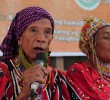The Philippine Overseas Employment Administration (POEA) has partially lifted the ban on the deployment of overseas Filipino workers (OFWs) in Nigeria and Lebanon, after the hostage crisis and bombing incidents, respectively, in these countries.
And now, a new alarm was raised over the continued holding of the 15 British sailors in Iran. Although there are only about 200 Filipinos in Iran, the fear is for the estimated 1.5 to 1.8 million overseas Filipino workers in the Middle East if a region-wide tension escalates.
During times of conflict, it is the OFWs who suffer. Two OFWs, who worked in Iraq, proved that deployment bans are useless.
BY AUBREY SC MAKILAN
Bulatlat
PART I – Rommel Sanchez: No Money and a Broken Family
Rommel Sanchez, 34, had always been a contractual worker in factories and fast food chains before he decided to work abroad.
In 1994, he worked as a fast food crew in the Kingdom of Saudi Arabia (KSA) until he was promoted to chief supervisor in 1998. At that time, he was earning P9,000 ($187.87, based on an exchange rate of P47.905 per US dollar) until his salary was increased to P23,000 ($480.12).
He only wanted to earn enough for his family but something unfortunate was about to happen. The next day, the Nepali opening manager said that the money supposedly earned the previous day, during Sanchez�s duty, was gone. If not for the missing money that amounted to about 25,000 Riyals (or about P500,000 or $10,437.32), he said he could have been promoted to the position of restaurant manager.
Sanchez said he was framed up by the Nepali manager and another Filipino.
Jailed
Sanchez was temporarily detained on Aug. 21, 1998 in a small Saudi jail. He said he would be released from a bartolina (solitary confinement) from 8 a.m. to 12 p.m. every day only to be tortured. The torture, he said, would resume at 1 p.m. until 5 p.m.
In a week of torture, he said he could only rest during lunch time, but could not eat because of pain. Food was offered only at lunch time. At about 50 degrees Celsius, Sanchez said, he passed out when police poured lukewarm water on him after he was released from a bartolina.
�Doon nanginig ang katawan ko, bumigay ako� (With that my body trembled and I passed out), he recalled.
When he gained consciousness at the hospital, his employer and a police were asking him to sign a waiver. Because the document was written in Arabic, Sanchez refused to sign it, thinking that it would only pin him down on the theft case filed against him. But he was forced to sign it when his employer promised that he could already go home to the Philippines after signing it.
To his surprise, Sanchez was brought to a bigger jail after three days. After talking to other detained Filipinos, he learned that it was a scheme in KSA.
�Embassy natin dekorasyon na lang �yun sa ibang bansa� (Our embassies are mere decorations in other countries),said Sanchez. �Abuso pa nga ang embahada natin� (They even abuse their power).
Sanchez said his mother, who was in Jeddah at that time, attempted to ask the help of the Philippine Consulate in Jeddah but to no response.
�Ang embahada natin, tagabigay lang ng passport, travel documents. Kaya mga kababayan natin nakukulong. Lalo ang mga Pilipinang tumatakas� (Our embassies are mere dispensers of passports and travel documents. That�s why so many of our countrymen go to jail, especially Filipinas fleeing their employers), he lamented, citing the cases of raped Filipinas who were being detained instead of their rapists.
After six months went by without any progress on his case, someone advised Sanchez to convert to Islam to facilitate a faster release. After the conversion, he was immediately sentenced to nine months� imprisonment and 350 lashes.
While completing his sentence, he would wash inmates� clothes or draw nude images for them. From doing these, he would be paid with cigarettes which he would sell to buy phone cards and send letters to his family here.
After completing his sentence, he was brought to Malas Jail. He spent one and a half months there waiting for his deportation.
�Kasumpa-sumpa doon, ang hirap grabe� (It was so despicable and difficult), he retorted. �Kahit iparating mo siguro sa gobyerno �to wala rin. Walang kuwenta. Embahada natin ipagpapabukas-bukas ka. Pamasahe pa lang sibak na, e, ang lalayo pa naman ng embahada natin (doon)� (Nothing would probably come out of it even if you bring this matter to the government. It�s of no use. Our embassies would keep procrastinating on your plight. The very fare going to the embassies is already a great burden, as they our embassies there are very far from our places of residence and work).
He was able to return to his family in 1999. He worked as a merchandiser of a food product, still as a contractual worker. After two years of no permanent job, he tried his luck again in a foreign land.
Pinoy Life Abroad









